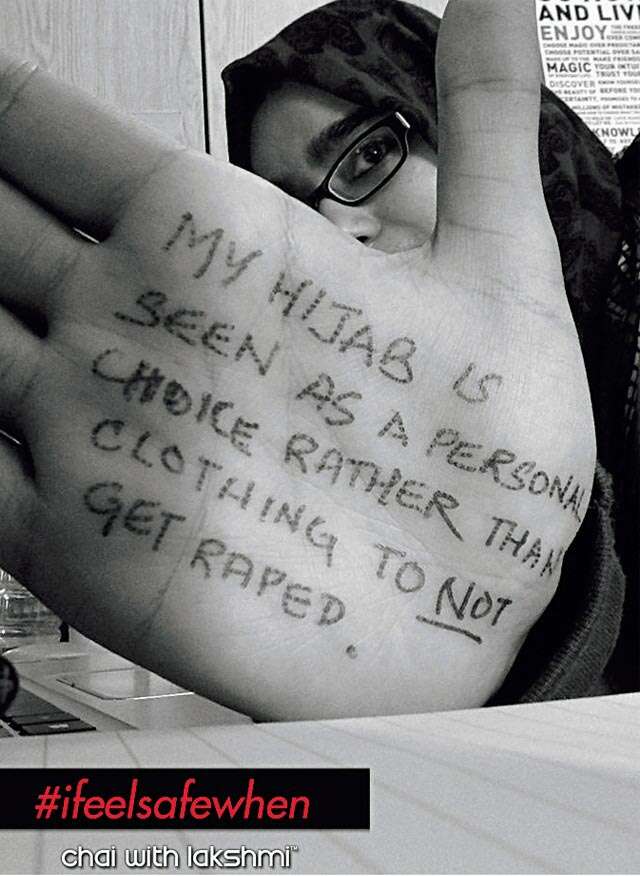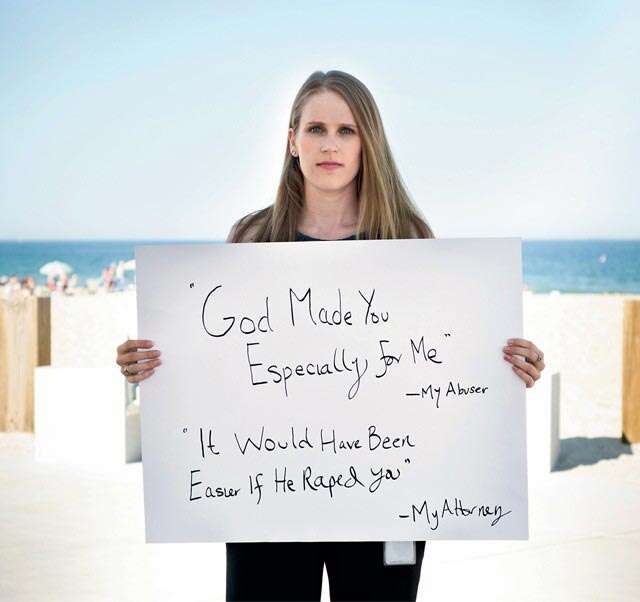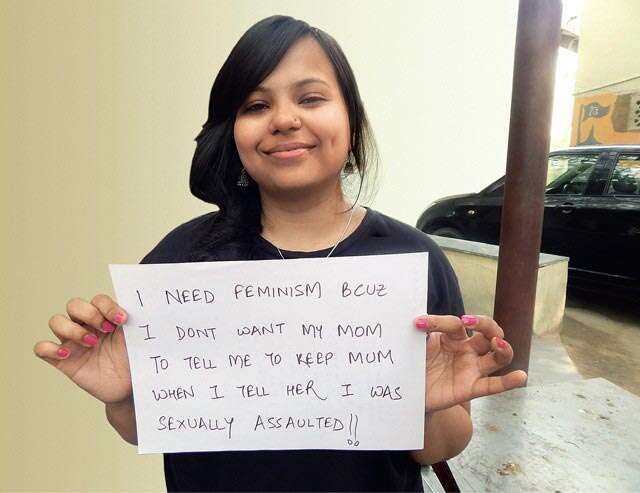Their idea initially was to just start a dialogue by encouraging women to speak up. Little did these women know that thanks to a growing online community of concerned citizens, their campaigns would go viral, sending out a powerful message to the world. Femina speaks to three women who got us talking and listening.

TAKING CHARGE - Lakshmi Rebecca created #ifeelsafewhen
Gayathri Chakkangal faces the camera almost defi antly holding out her palm, with words written in blue ink: #ifeelsafewhen rape is everyone’s problem. Sonali Shyam’s palm reads #ifeelsafewhen seen as a person not an object. The girls were a part of a campaign on Twitter that went viral a few months ago. #ifeelsafewhen asked people to complete the sentence on their palms, take a selfi e with their faces visible and share the selfi e on Facebook and Twitter.
The campaign was started by Lakshmi Rebecca, the 33-year-old host of India’s first award-winning online talk show, Chai With Lakshmi, following the Badaun rape case in Uttar Pradesh and an incident in Meghalaya where a woman was shot in the head for resisting some militants’ rape attempt outside her home. “It was also a reaction to the fact that an act of violence against a woman continues to happen every 22 minutes in India. We want women to feel safe and we want to know what will make them feel safe,” explains Lakshmi. And so she asked people to share their selfi es in a Facebook message, Twitter or via email.
Lakshmi says, “When we began, we expected to start a conversation that was constructive.” A model, anchor and fi lmmaker, Lakshmi owns a film production house called Red Bangle that makes ad fi lms, corporate films, animated marketing fi lms and web films. Not surprisingly, with an online talk show that has received over 30 lakh views, Lakshmi is a fi rm believer in the power of social media. She says, “Social media is a great tool for people to voice their opinions.
It allows for a spontaneous response and interaction.” So far, Lakshmi has received about 270 selfi es. She hopes to see the campaign get over 1,000 responses, so that her team can study the messages for patterns, for insights that will tell them what to do next. “At a time when most news is about what is going wrong, we felt that it was important to consider what could be right and how. This campaign shifts the focus positively.”
By Upneet Pansare

STRENGTHENING SURVIVORS - Grace Brown Founded project-unbreakable.org
Boston-based photographer Grace Brown was only 21 when she started Project Unbreakable, an online platform that features photos of sexual assault survivors holding placards—written on these are words their attackers said to them.
In October of 2011, Grace was out with a friend one night when her friend suddenly confided in her about a sexual assault she had survived. “It wasn’t the worst story I had heard and it wasn’t the first, but something about it really got to me. I went home that night counting the number of people I knew who had been sexually assaulted. The next morning, I woke up with the idea for the project,” writes Grace, in an email interview with Femina. Project Unbreakable had just one goal—to create awareness about sexual assault and to open up the topic of something that was not talked about as much as it should have been. But Grace and her team soon
discovered that it could also help sexual assault survivors heal.
“I have always been extremely artistic and extremely sensitive, which I think plays into why I created Project Unbreakable. I think it really helps people let go of the words that were said to them.” One of the people who submitted her photograph to Project Unbreakable, Jessica, writes, “There was certainly something intense about standing on a boardwalk in front of the ocean holding up a sign, essentially telling the world that I could no longer be silenced.” Another survivor writes, “Prior to discovering Project Unbreakable I lived every day in silence and loneliness…After submitting my picture and seeing it on the website, I felt stronger than I have since my assault six years ago. I was able to tell my mother, I was able to tell my friends, and I was able to begin healing completely for the first time ever…Without Project Unbreakable I would still be suffering in silence. Thank you.”
“The first time I published the entries on my website, I got incredible feedback,” she says. She began by photographing people she knew. In a matter of a few days, she suddenly started to receive hundreds of emails from people wanting to be involved in the project. “So I actually didn’t have to convince anyone. I wouldn’t want to—I don’t want anyone to participate if they are not ready.”
Project Unbreakable receives about 15 to 20 submissions daily. According to Grace, it’s less than when they first started.
In total, they’ve received over 4,000 submissions, both photos taken by Grace and submissions from all over the world. Grace admits, “It has gone viral a few times, and
it always starts from an interview or a video or something of that nature.
Needless to say, I had no idea it would happen! I thought it would stay very small, with only 15 or so photographs!”
Grace and her team of four women all in the age group of 19 to 22, are still receiving submissions and she is still photographing. The director of the project Kaelyn Siversky and Grace also travel and speak at universities around the world to discuss the importance of sexual assault awareness and to showcase their work.
By Upneet Pansare

FOSTERING FEMINISM - Japleen Pasricha Started the Feminism In India Project
"There are too many of us getting groped in public, stared at, catcalled, insulted, teased and abused. There are too many headlines about girls getting raped. Too
many people are trying to fi t both the male and female genders in a box. Too much of ‘girls can’t do this’ and ‘boys should do this’. We initiated the I Need
Feminism campaign to set a platform for both women and men to voice out their opinions and beliefs,” this is how 25-year-old Delhiite Japleen explains the social media movement she started on her blog.
When Japleen started the Feminism In India Project, on Facebook, in 2013, the idea was to educate and develop a feminist consciousness among young people. In April this year, she took it a step further. Taking a page out of a successful campaign organised at Oxford University and at Cambridge University, which asks people why or
how feminism is important to them, Japleen organised the I Need Feminism campaign at Indira Gandhi Institute of Technology (IGIT), Delhi, and at Ambedkar University, Delhi (AUD).
“We asked people what the word ‘feminism’ meant to them and told them to write their thoughts on placards. They were shot holding up these notes and the photographs were published on our Facebook page,” she says. Something about the idea caught the collective imagination online. During the campaign, over 100 people opened up. Japleen set the ball rolling by posing with a placard she made, which said, “I need feminism because I was once sexually harassed in the metro and was too scared to speak up.”
The campaign helped people open up and talk about the issues of sexual harassment, rape, stereotypes, etc, she says. “We can have strict laws, safe spaces and access to everything—but rapes occur even in countries that have these. I feel that these things alone won’t work. Changing mindsets is the most important thing,” says Japleen.
By Deepa Suryanarayan